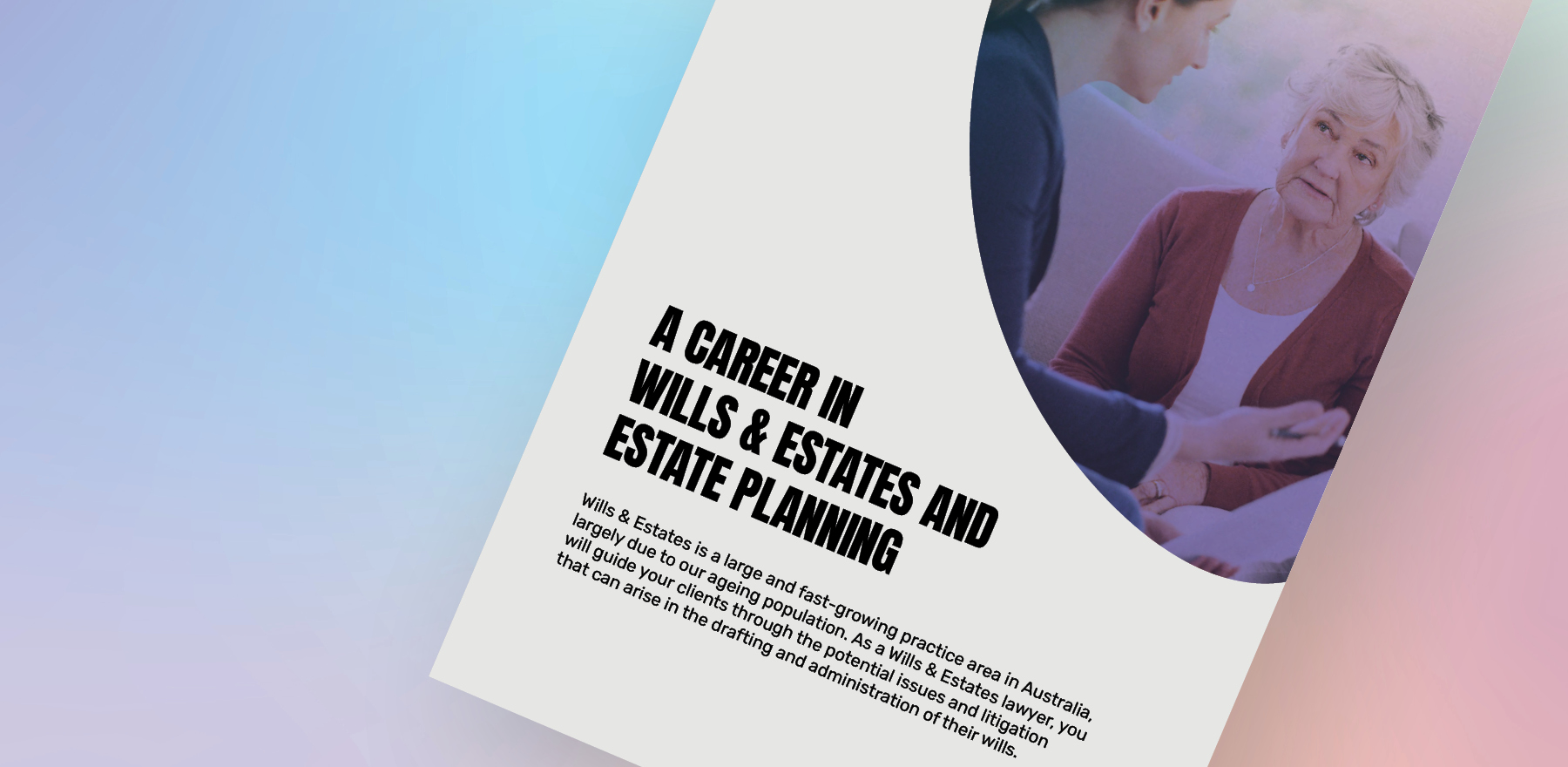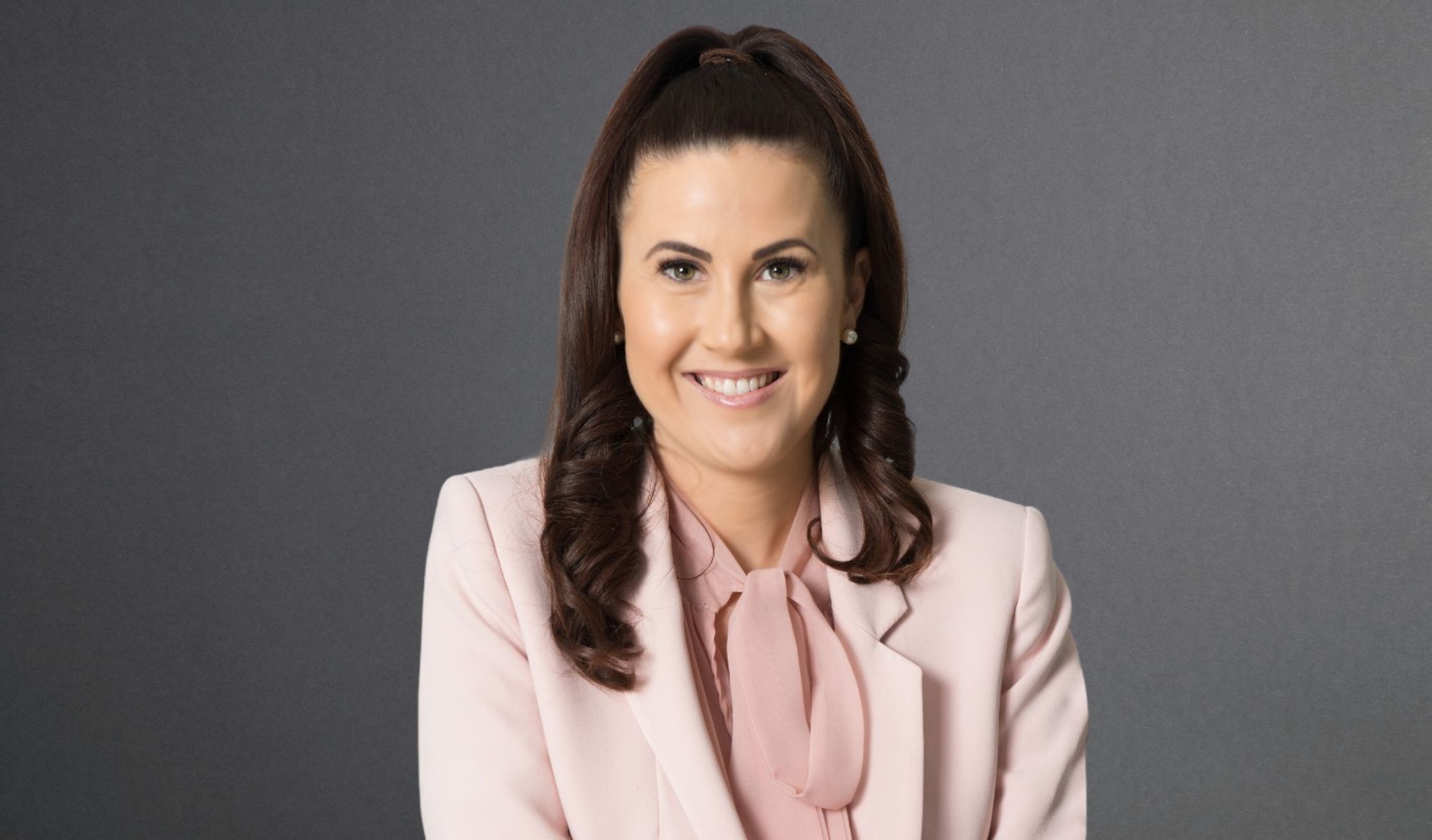Build your career
Options to complete a Graduate Certificate, Graduate Diploma or Masters and advance your career
Advance your expertise
Sharpen your expertise in specific practice areas with practical, real-world focused subjects designed to elevate your proficiency.
A POSTGRADUATE QUALIFICATION GIVES YOU AN EDGE
The College of Law can help you expand on what you already know and acquire new knowledge while providing you with opportunities to hone your skills in a practice area, so that you stand out from the competition.
Open up new career pathways by studying a Graduate Certificate, Graduate Diploma or Master of Laws program. One that’s reality-based, balanced and world-renowned, so you can become the best version of yourself for your client, practice and community.
This is your chance to build career prospects, earn industry recognition, and boost your earning potential.
Curious about where your skills could take you next? Scroll down to explore the variety of practice areas, detailed course subjects, and potential awards waiting for you. Find your perfect fit and tailor your education to your career ambitions.
Intake 3, Starts 11 August 2025 | Intake 4, Starts 10 November 2025
PROGRAM OPTIONS
Select a practice area to explore relevant courses and subjects
PROGRAM OPTIONS - ESTATE PLANNING
Graduate Certificate in Applied Law
2
Choose any two subjects in your chosen area
A recognised law degree (LLB, JD, or equivalent)
Approx 6 months
Graduate Diploma of Applied Law
4
Choose four subjects in your chosen area
A recognised law degree (LLB, JD, or equivalent)
1 year part-time
Master of Laws (Applied Law) majoring in Estate Planning
8
3 EPP subjects, 4 elective subjects or a second major and the Capstone project in Estate Planning
A recognised law degree (LLB, JD, or equivalent)
2 years part-time
OR START WITH A GRADUATE CERTIFICATE
Take control of your career
If you decide later to progress towards a Masters, you’ll receive credit towards that award.
ESTATE PLANNING SUBJECTS
EPP00 - Capstone Project (Estate Planning)
Intake 2, 4TOPICS
THE SUBJECT HAS FOUR COMPONENTS
- Four short answer questions
- Two legal writing samples
- Oral communication (e.g. client interview) assessment held through online conferencing
- Reflective analysis
EPP1 - Foundations of Estate Planning
Intake 1, 3, 4While lawyers are not financial planners, understanding the financial issues is critical to estate planning. This subject covers a range of financial planning matters which fall within the ambit of a solicitor, from business structures to insurance matters. Students learn how to apply these financial concepts to the drafting of a client advice and an estate plan.
This subject will cover preparing an estate management plan, setting up structures to protect the estate, taxation of estates, protecting the estate from claims, superannuation, insurance, asset transfer to companies, trustees and other entities and challenges to estate planning strategies.
This subject will provide an introduction to estate planning and some of the estate planning tools and strategies that are available. It will take students through the basics of how to prepare an estate plan. It covers the legislation and case law governing the use of discretionary trusts, superannuation and insurance as estate planning and asset protection tools.
TOPICS
- Introduction to estate planning
- Capacity and substitute decision making
- Basics of superannuation
- Identifying asset structure
- Triggers for review Insurance
- Taxation of deceased estates
EPP2 - Superannuation
Intake IntensiveTOPICS
- The regulatory framework for Australian superannuation
- Establishment and maintenance of self-managed superannuation funds
- Concessional and non-concessional contributions
- Investments in self-managed superannuation funds and life insurance policies
- Self-managed superannuation funds - family law, bankruptcy and financial attorneys
- Lifetime payments to fund members - pension options and lump sums
- Superannuation death benefits
EPP3 - Business Succession Planning
Intake 1, 3When establishing a business, proper structuring from the outset is key from a commercial, taxation and estate and succession planning perspective. This subject covers a range of structuring issues which lawyers should have regard to when advising on the implementation of an Australian business structure, lifetime restructure as well as succession planning on retirement, death or disability.
The subject focuses on these issues as they relate to Australian family businesses and Australian small and medium-sized enterprises. This subject will cover the different types of structures commonly used in Australia (including trusts and companies), issues relating to family farming businesses, transition of wealth during one’s lifetime, buy/sell insurance mechanisms in agreements and estate planning and transition of control on death or incapacity. The subject also touches on taxation and asset protection relevant to business structuring and succession planning.
Whilst EPP3 Business Succession Planning is a subject within the Estate Planning major, it is also relevant for lawyers practising in other areas including corporate and commercial law, wills and estates, property and family law. It will equip students with the necessary understanding to advise on and implement an effective succession plan for family business owners in Australia.
TOPICS
- Private companies
- Unit trusts Family discretionary trusts and other types of structures
- Family discretionary trusts and succession planning
- Soft skills, second generation planning and transitioning succession
- Small business CGT concessions and the small business rollover
- Buy/sell agreements on death/incapacity
- Death and incapacity: the use of wills, binding nominations and powers of attorney
EPP4 - Inter Vivos and Testamentary Trusts
Intake 4TOPICS
- Introduction to estate planning and trusts
- Specialty trusts – superannuation, disability and minors
- The trust deed Trustees’ powers and duties
- Discretionary trusts
- Trusts and asset protection
- Trusts and revenue tax law
- Structuring trust arrangements
EPP5 - Accounting and Tax for Estates and Trusts
Intake 2TOPICS
- Roles of LPR and trustee
- Capital gains tax
- Deceased's taxation affairs
- Deceased estate
- Accounting for trusts
- Testamentary trusts
- Non-resident issues
- Miscellaneous issues
EPP6 - Applied Taxation Strategies
Intake 3TOPICS
- Tax effective estate planning
- Taxation of deceased estates
- Structures and taxation strategies Income, assets and taxation
- Goods and services tax (GST)
- International taxation and estate planning
- Anti-avoidance Recent developments for testamentary trusts
START DATES
| Feb Intake 1 | May Intake 2 | Aug Intake 3 | Nov Intake 4 | |
|---|---|---|---|---|
| START DATE | 10 Feb 2025 | 12 May 2025 | 11 Aug 2025 | 10 Nov 2025 |
| CENSUS | 26 Feb 2025 | 28 May 2025 | 27 Aug 2025 | 03 Dec 2025 |
| END DATE | 02 May 2025 | 01 Aug 2025 | 31 Oct 2025 | 06 Feb 2026 |
| Subject | Start Date | Census | End Date | Workshop Date |
|---|---|---|---|---|
| DRP3 - Advocacy | 22 Sep 2025 | 01 Oct 2025 | 31 Oct 2025 |
15 - 17 October 2025 |
| DRP4 - Mediation | 06 Oct 2025 | 15 Oct 2025 | 14 Nov 2024 |
TBC |
| FDR1 - Family Law and Mediation | 11 Aug 2025 | 20 Aug 2025 | 19 Sep 2025 |
1 - 3 September 2025 NSW/VIC |
| FDR2 - Children’s Matters, Family Law and Family Dispute Resolution | 22 Sep 2025 | 01 Oct 2025 | 31 Oct 2025 |
16 - 18 October 2025 NSW/VIC |
| FDR3 - Advanced Family Dispute Resolution | 05 May 2025 | 14 May 2025 | 13 Jun 2025 |
26 - 28 May 2025 NSW & VIC 24 - 26 November 2025 NSW/VIC |
| FDR3 - Advanced Family Dispute Resolution | 03 Nov 2025 | 12 Nov 2025 | 12 Dec 2025 |
26 - 28 May 2025 NSW & VIC 24 - 26 November 2025 NSW/VIC |
| FDR4 - Case Management in Family Dispute Resolution Capstone | 16 Jun 2025 | 25 Jun 2025 | 25 Jul 2025 |
7 - 9 July 2025 QLD & WA
|
| FDR4 - Case Management in Family Dispute Resolution Capstone | 26 Jan 2026 | 04 Feb 2026 | 06 Mar 2026 |
7 - 9 July 2025 QLD & WA
|
| FDR5 - Virtual Simulated Practice | 08 Sep 2025 | 18 Sep 2025 | 31 Oct 2025 |
Day 1 – 26 September 2025 |
| LB3 - Business Strategy: Planning for Success | 03 Nov 2025 | 12 Nov 2025 | 12 Dec 2025 |
| Subject | Start Date | Census | End Date | Workshop Date |
|---|---|---|---|---|
| FDR1 - Family Law and Mediation | 11 Aug 2025 | 20 Aug 2025 | 19 Sep 2025 |
1 - 3 September 2025 NSW/VIC |
| FDR2 - Children’s Matters, Family Law and Family Dispute Resolution | 22 Sep 2025 | 01 Oct 2025 | 31 Oct 2025 |
16 - 18 October 2025 NSW/VIC |
| FDR3 - Advanced Family Dispute Resolution | 05 May 2025 | 14 May 2025 | 13 Jun 2025 |
26 - 28 May 2025 NSW & VIC 24 - 26 November 2025 NSW/VIC |
| FDR3 - Advanced Family Dispute Resolution | 03 Nov 2025 | 12 Nov 2025 | 12 Dec 2025 |
26 - 28 May 2025 NSW & VIC 24 - 26 November 2025 NSW/VIC |
| FDR4 - Case Management in Family Dispute Resolution Capstone | 16 Jun 2025 | 25 Jun 2025 | 25 Jul 2025 |
7 - 9 July 2025 QLD & WA |
| FDR4 - Case Management in Family Dispute Resolution Capstone | 26 Jan 2026 | 04 Feb 2026 | 06 Mar 2026 |
7 - 9 July 2025 QLD & WA |
| FDR5 - Virtual Simulated Practice | 08 Sep 2025 | 18 Sep 2025 | 31 Oct 2025 |
Day 1 – 26 September 2025 |
TEACHING STAFF






Nathan Yii
Principal Lawyer, Chartered Tax Advisor, Trust & Estates Practitioner and SMSF Specialist Advisor
Nathan Yii Lawyers


Latest
HAVE QUESTIONS OR READY TO ENROL?
Book a call back with one of our Customer and Student Engagement Advisors

I really enjoyed The College of Law’s practical assessment style; I could apply the skills and knowledge I gained from these assessments to my everyday work. – Sian Ogge, LLM Graduate

I graduated six months ago, and since then I've actively sought to implement what I've learned into my day-to-day practice. – Krystal Bellamy

It expedited my career in succession law by a decade
Craig Gregson
DISCOVER MORE
Scholarships
If you’re experiencing financial hardship and unable to afford postgraduate study, see if you are eligible for the The Kay Smith Scholarship. This scholarship honours one of the longest serving and most respected people of The College of Law. It is designed to support the education aspirations of outstanding law graduates and young lawyers.
Guide download
Inside the course guide, you will find information on: how this practical program will equip you with the skills and tools you will need, who the course is for, course format, topics and assessment structure, course presenters, workshop dates, prices and how to enrol.
Student success stories
Read how Craig’s postgraduate study accelerated his career by a decade and enabled him to become a specialist and eventually started his own firm.
FREQUENTLY ASKED QUESTIONS
This depends on your workload and your personal situation. If you complete one subject every intake, you could complete your Masters in two years. However, you have five years to complete the course from your intake commencement date.
You can do any of the following without financial penalty any time before the published census date for each intake:
- Withdraw completely
- Change the subject or course you are enrolled in
- Defer it to a subsequent intake (must be within the next 12 months)
As you have five years to complete your Masters, you don’t need to complete a subject every intake. However, if you do not study for two consecutive intakes – then you can apply for a Leave of Absence.
You can only request a leave of absence twice over the course of your studies.
We recommend that you set aside 10-12 hours a week on study per subject, one unit per semester.
Completing two subjects in the same intake may require up to 25 hours of study and readings each week.
There are four intakes a year, February, May, August and November.
You may be entitled to claim your full 10 units per subject for your CPD requirements.
However, you may still need to complete some mandatory CPD units. Please check with your local law society for the requirements in your state or territory.
WA based students may claim up to six units per subject (six CPD units for an intensive subject that has a compulsory workshop requirement or four CPD units for any other subject).
College will lodge the CPD points with the Legal Practice Board on successful completion of the subject(s).
The College’s Credit for Prior Learning Policy encourages practitioners who have completed previous postgraduate and other recognised study to apply for credit towards either the LLM (Applied Law) or the Master of Applied Law (Family Law).
A maximum of three subject credits may be granted towards the Masters awards.
- If you have undertaken a Graduate Diploma of Legal Practice with The College of Law within the last ten years, you may apply to receive up to two elective subjects of unspecified credit
- If you have undertaken a Graduate Diploma of Legal Practice with another provider within the last ten years, you may apply to receive one elective subject of unspecified credit
- If you have undertaken other postgraduate study, such as an LLM or Graduate Diploma of Law, whether you have completed the award or not, you may be eligible to receive credit for that study
- Accredited Specialists may qualify for exemption of the foundations subject and Capstone Project for their area of major
- Applicants who have completed a Legal Practice Management Course within the last 5 years at The College of Law in may receive one subject specified credit
Yes. Many Master of Laws (Applied Law) students choose electives from our Legal Business Management course. Please contact us to learn how.
No. To become a Family Dispute Resolution Practitioner, you will need to:
- Complete the Graduate Diploma in Family Dispute Practice (FRDP) which satisfies six core units of competency
- Seek accreditation with the Commonwealth Attorney-General’s Department
Many students choose to pursue an LLM with a double major in Family Law and FDRP.
For 2025, each subject in our postgraduate programmes costs $4,150, with no GST applicable. Please note that our fees are subject to annual review and may change during your enrolment.
Full payment is required at the time of enrolment each semester, and we accept various payment methods including cheque, Electronic Funds Transfer (EFT), and credit card.
Additionally, if you are an Australian citizen, a New Zealand citizen, or hold a permanent humanitarian visa, you may be eligible to defer your payment through the Australian Government's StudyAssist FEE-HELP scheme.
Yes, if you are an Australian citizen or permanent resident, you may be eligible to receive FEE-HELP. For more information, visit the Australian Government Study Assist website or download the Study Assist FEE-HELP information sheet.
Please note that StudyAssist FEE-HELP is not available for single subject enrolment.
Yes, you can, but Study Assist FEE-HELP will not apply.
Yes. If you are from a non-English speaking country or your previous studies were in a language other than English, you will need to demonstrate your English skills in accordance with the IELTS standard before starting the program. The requisite IELTS standard is at level 8 (writing), 7 (listening), 7.5 (speaking), 7 (reading), and 7.5 overall.
JOIN OUR NEWSLETTER
Sign up to keep up to date with latest news, programs, events and career tips.


































